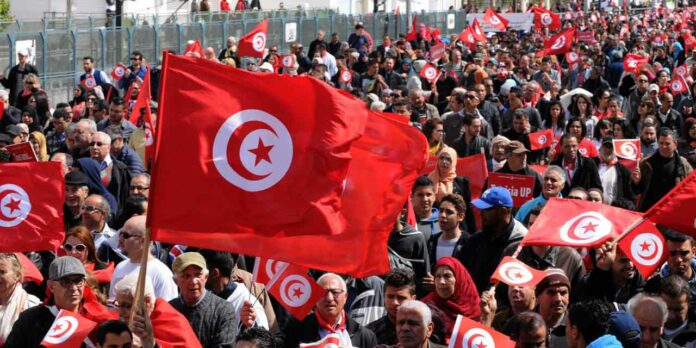In conjunction with the Ennahda Movement’s call for its supporters to demonstrate on Saturday noon, February 27, to “protect the country’s constitution and democracy and to accelerate developmental and social reforms,” the Labor Party, in turn, in a blog post it published on its official Facebook page, called “to the gathering in Bab Al-Khadra Square on Saturday starting from 12:00 then going through “El-Passage – Habib Thameur, down to Habib Bourguiba Street, to denounce the regime’s tampering with the interests of Tunisia and its people,” which is almost the same place and time in which the supporters of the Ennahda Movement will gather.
The Free “Destourian” (i.e. Constitutional) Party headed by Abir Moussi had organized a “protest movement” in the form of a popular rally in the city of Sousse a few days ago.
All these simultaneous movements from different political parties and schools call into question the extent to which the street has been transformed into an arena for conflict and a field for “power show.”
Take refuge in the street
The professor of contemporary history and political analyst Dr. Abd al-Latif al-Hanashi said today, Friday, February 26, 2021, that the step to go to the street, if Ennahda movement takes it, and its opponents confront it by going to the street as well, it will be very dangerous in the direction of generalizing the conflict, making it horizontal and societal, after it has been remaining within the ruling palaces and in its corridors and around the elites only.
He added that the ballot boxes are supposed to be referred to in order to settle disputes and resolve conflicts and make choices, however, politicians preferred to resort to the squares to demonstrate in them.
He explained that for the parties at the present time the street is a measure of their ability to mobilize and assemble, especially since the electoral elections are still far away, and there is no real measure at the present time to control the degree of their popularity other than the street.
He stressed that each side is trying in turn to prove that it has a popular depth and puts itself in comparison with the President of the Republic, Qais Saeed, who also chose to take to the streets when the crisis with the prime minister intensified.
And he considered that resorting to the street is nothing more than a show of muscles and that no conscious and responsible discussion will be dragged on it, pointing out that the public space needs a rational and wise dialogue away from the logic of conquest, according to him, indicating that these calls come in light of the current political impasse because if the political channels were operating normally, the street would not be resorted to.
Is the street for the opposition or for the government?
Ennahda’s call for demonstrations provoked various reactions about the “legitimacy” of this call, especially as it is represented in the government. The resigned leader of the movement, Lotfi Zitoun, said in an interview to the National Channel that “the street is a place for minorities’ protest and not a place for resolving constitutional crises or conflicts of state institutions.”
Lotfi Zitoun wrote on his Facebook page, “A street against a street is a return to the 2013 square and a recipe for the civil war the fire of which will burn those who contribute to its ignition, adding that the solution is to sit at the dialogue table and make concessions, other than this, go to the elections. For those who want to resort to the street, why do they refuse to appeal to the ballot? ”
For his part, the spokesman for Ennahda, Fathi Al-Ayadi, affirmed that the aim of the move organized by the movement is to defend the democratic experience, which he considered targeted by parties working to undermine it at any cost through exclusion, speech and calls to dissolve Parliament and withdraw confidence from its president.
He said that the demonstration was not an attitude towards any party nor was it a reaction to any previous practice that took place in the street, but rather a defense of the constitution of the republic and state institutions.








